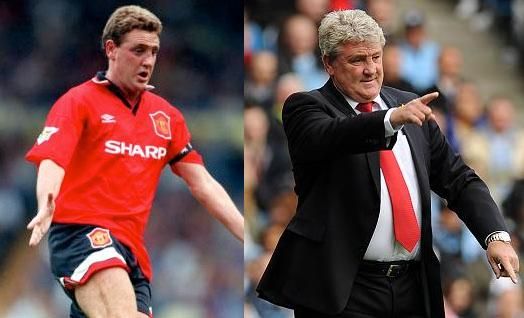
Manchester United players who became managers: Part I
When a professional footballer retires from an active playing career, he has a host of options as to what he intends to do post-retirement. There’s coaching and management, media jobs like writing columns for a newspaper or even football punditry on TV, radio and podcasts. However, more often than not, a retired footballer longs to stay connected to the game he loves the most, which probably explains the natural progression of most retired footballers towards coaching and management.
In the first part of a two-part series, we look at those Manchester United players who went on to take up the managerial reins at a football club:
Steve Bruce:
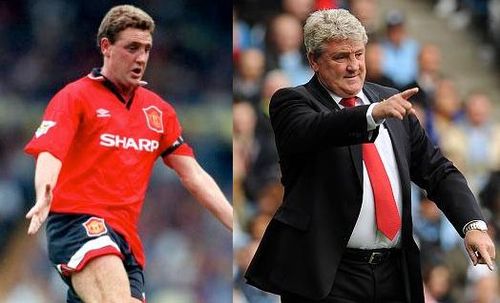
Steve Bruce
Also known as ‘Dolly’ from his Manchester United days, the boyhood Newcastle fan started his professional career as a midfielder at third-division club Gillingham, before moving to top-division football at Norwich City. His match-winning performances at Carrow Road caught the eye of Manchester United manager Sir Alex Ferguson, who signed him in 1987. At United, he formed one of English football’s most successful central defense partnerships with Gary Pallister and won 3 Premier League titles, 3 FA Cups, a League Cup and a European Cup Winners’ Cup in his 9 years at the club. Thereafter, he had stints with Birmingham City and Sheffield United, before retiring from professional football in 1999.
He started his managerial career as player-manager at Sheffield United in 1998 and led them to eighth place in the First Division (Championship) in his first season, but left right after the season citing boardroom problems. He then went on to manage Huddersfield Town, Wigan Athletic and Crystal Palace in the next 2 years, which gave him his reputation of a nomadic manager. He finally joined Birmingham City (where he was formerly a player) in 2001, where he spent six years overseeing both promotion to the Premier League in his first season and then relegation to the Championship in 2006, before securing promotion again the next season.
He then joined Wigan Athletic for a second stint in 2007 and fought off the threat of relegation in his first season, before leading the Latics to an 11th place Premier League finish the following season. Sunderland came calling in June 2009, and he joined the Wearside club on a three-year deal. He led the Black Cats to mid-table finishes in his first two seasons, before being finally dismissed in November 2011 after a poor run of form saw Sunderland languishing just above the relegation zone.
Roy Keane:
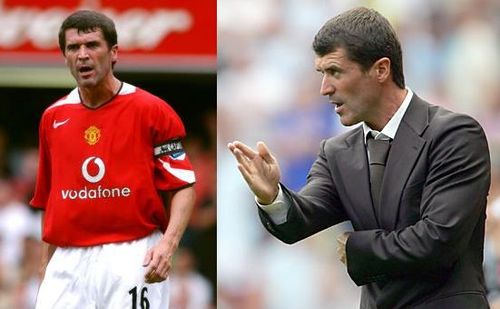
Roy Keane
One of the finest players ever to wear the Manchester United shirt, the combative midfielder’s true potential was first recognized by Brian Clough’s Nottingham Forest when the Irishman was playing for Irish semi-professional club Cobh Ramblers. He signed for them in 1990 and spent 3 seasons in their first team, but left for Manchester United for a record fee of £3.75 million. In his 12 years at the club, he won 7 Premier League titles, 4 FA Cups, one Champions League title and the Intercontinental Cup. This also included the ‘Treble’ in 1998-99, when he captained the Red Devils to win the Premier League, the FA Cup and the Champions League all in one season. However, his altercation with manager Sir Alex Ferguson after an explosive interview to MUTV in 2005 sparked a controversy and he left Manchester United for Scottish club Celtic. He played for six more months, before hanging up his playing boots.
Keane chose to launch his managerial career at Sunderland, taking over from fellow Irishman Niall Quinn. When he took over the mantle at Wearside, the club was reeling in the relegation zone of the Championship, second bottom of the points table. However, he transformed the fortunes of his team, leading them to promotion to the Premier League in his first season itself by winning the Coca-Cola Championship title. This spectacular revival of Sunderland within a season also earned him the ‘Championship Manager of the Year’ award.
Sunderland managed to survive the drop in their first season back in the Premier League but the team’s form remained highly inconsistent in the next season. A run of six games without a win resulted in the Black Cats falling into the relegation zone, which prompted Keane to stand down as manager in November 2008. He was appointed as manager of Championship club Ipswich Town in the 2009-10 season but his inability to build a side capable of challenging for promotion saw him dismissed in January 2011.
Paul Ince:
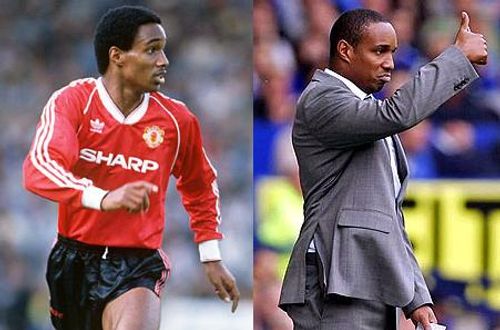
Paul Ince
The Englishman has had a playing career with eight different clubs over 21 years, most notably Manchester United, Internazionale, Liverpool and West Ham United. He started his career as a youth player at West Ham and spent 3 seasons in the first team, before securing a controversial big money move to Manchester United in 1989. There, he won two Premier League titles, two FA Cups, one European Cup Winners’ Cup and a League Cup, while forming stellar midfield partnerships with Bryan Robson first and later Roy Keane. But frequent fall-outs between him and manager Ferguson saw him sold off to Italian giants Internazionale in 1995. He played a major role in Inter’s run to the UEFA Cup final in the 1996-97 season but had to content with a runners-up medal as they lost to Schalke on penalties. He then became one of the few players to play for both Manchester United and Liverpool, when he joined the Merseysiders in 1997. He later had stints with Middlesbrough and Wolves before becoming player-coach of Swindon Town in 2006.
He then moved to League Two club Macclesfield Town as player-manager a year later, before taking up the job of a full-time manager at Milton Keynes Dons. He led the Dons to automatic promotion by securing the League Two championship title in his first season at the helm, but left to manage Premier League club Blackburn Rovers in the close season.
However, a record of just 3 wins out of 17 league games saw him sacked within six months of being in charge. He then had unsuccessful spells at his old club MK Dons and Notts County, which plunged his managerial career into a forced hiatus.
Darren Ferguson:
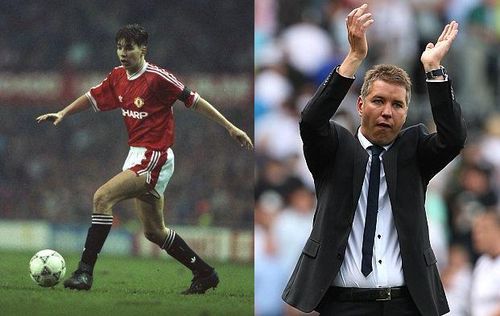
Darren Ferguson
The youngest son of Manchester United manager Sir Alex Ferguson, he started his youth career as a midfielder at Manchester United before moving on to the first team. He spent 4 seasons as part of the first team but managed only 27 appearances, which saw him being offloaded to Wolves in 1994. He spent 5 years at the Molineux before moving to Dutch side Sparta Rotterdam, where he spent a year. He finished his playing career at Wrexham in 2007, making over 300 appearances.
He then followed his father’s footsteps into club management, joining League Two side Peterborough United as player-manager and leading them to successive promotions in his second and third season at the helm. However, he left the club by mutual consent in November 2009 when Posh were at the bottom of the Championship table.
He joined Preston North End two months later, but his team’s indifferent form meant Ferguson was sacked within a year of his appointment. Peterborough United, now in League One, brought him back into the fold again days later and the Scot inspired his team to fourth position in the league, subsequently beating Huddersfield Town in the play-off finals at Old Trafford and securing promotion to the Championship.
Brian Kidd:
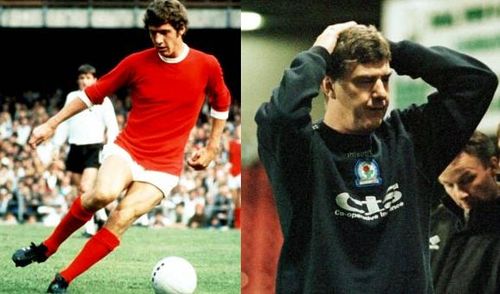
Brian Kidd
He was part of the legendary Manchester United team that won the European Cup in 1968 under Sir Matt Busby, scoring in the final against Benefica. A prolific goal-scoring striker of his time (215 goals in 545 career appearances), Kidd spent 10 years playing for the Red Devils, 3 of them as a youth team player. He finally left in 1974, going on to feature for English clubs like Arsenal, Manchester City, Everton and Bolton Wanderers, before moving to the now-defunct North American Soccer League to spend the final days of his playing career.
His management career failed to launch at Barrow and Preston North End, but Sir Alex Ferguson brought him back to Manchester United as a youth team coach, where he worked with the likes of talented youngsters such as Ryan Giggs and the youth batch famously known as ‘Fergie’s Fledglings’. He was promoted to the position of assistant manager in 1991 and helped Ferguson’s team to win 4 Premier League titles, 2 FA Cups and a League Cup, before leaving United to manage Blackburn Rovers in December 1998.
A good start to his time at Blackburn proved to be a false dawn as he was sacked just about a year later when Blackburn were lying in the relegation zone. He then had stints as assistant manager at Leeds United, the England national team, Sheffield United, Portsmouth and is currently serving as assistant manager to Roberto Mancini at Manchester City.
Watch out for the second part of the series, in which we will look at some more former Manchester United players who underwent the transition to football management.